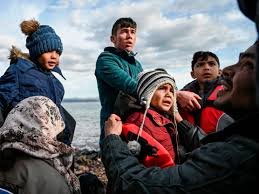Refugees in Turkey are headed towards European frontiers after the borders had been thrown open, a response to the escalating war in Syria where 33 Turkish soldiers were killed by Russian-backed Syrian government troops.
Moscow and Ankara traded blame over Thursday’s strike in northwest Syria, the deadliest attack on Turkish forces in nearly 30 years.
The UN Security Council called an emergency meeting to avert open conflict between Russia and NATO member Turkey.
US President Donald Trump, in a phone call with Turkish President Tayyip Erdogan, condemned the attack and reaffirmed Washington’s support for Ankara’s efforts to avert a humanitarian disaster in Syria.
The two leaders also said Syria and Russia must halt their offensives in northwest Syria, White House spokesman Judd Deere said.
UN Secretary-General Antonio Guterres described it as “one of the most alarming moments” of the nine-year-old Syrian war.
“The most pressing need is an immediate ceasefire before the situation gets entirely out of control,” Guterres told reporters in New York.
Turkey’s neighbours Greece and Bulgaria, both European Union member states, vowed not to admit the migrants and reinforced their borders following Ankara’s threat to reopen the frontier.
It was closed under an accord between Turkey and the European Union that halted the 2015-16 migration crisis when more than a million people crossed into Europe by foot.
As news of Thursday’s strike emerged, a senior Turkish official told Reuters the government had decided, effective immediately, not to stop Syrian refugees from reaching Europe “by land or sea,” and that police and border guards had been stood down.
“All refugees, including Syrians, are now welcome to cross into the European Union,” said the official.
Within hours hundreds of migrants, some wearing face masks in an apparent attempt to guard against the coronavirus outbreak sweeping the world, began arriving on the European frontier in the early morning light.
“We heard about it on the television,” said Afghan migrant Sahin Nebizade, 16, in a group packed into taxis on the outskirts of Istanbul.
At the Pazarkule border post with Greece, scores of migrants faced barbed wire fences and smoke grenades. Some stuck in the no-man’s land between the two countries tried to return to the Turkish side, only to be turned back by Turkish authorities.
The EU said that Ankara had made no formal announcement of any change in policy at the border.
Inside Syria, there was ample evidence of the renewed fighting that has caused perhaps the worst humanitarian crisis of the conflict.
A million civilians have been displaced since December inside Syria near the Turkish border in desperate winter conditions. Turkey, already home to 3.7 million Syrian refugees, says it cannot take more.
Syria’s civil war has worsened dramatically in recent months despite largely vanishing from Western countries’ agendas.
Government forces, backed by Russian air power, have launched a major assault to capture the northwest, the last remaining territory held by rebels backed by Turkey.

